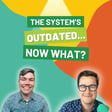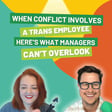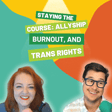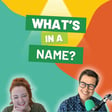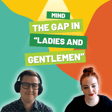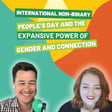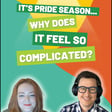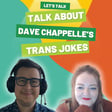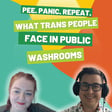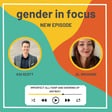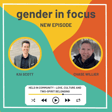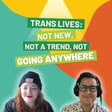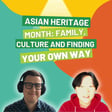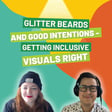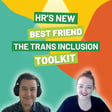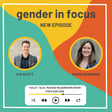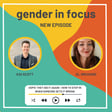Introduction to Gender in Focus
00:00:02
Speaker
This is Gender in Focus. I'm El, and each week I sit down with the president of Trans Focus Consulting and all-round gender diversity genius, Kai Scott. I get to ask all the questions you've ever wanted to ask about how to make the workplace and the world a better place for trans and non-binary people.
00:00:20
Speaker
Let's get into it.
National Trail Day & Gender Diversity
00:00:23
Speaker
I'm really excited about today's topic, which is National Trail Day. Some may wonder what's this got to do with gender diversity, and don't worry, we'll tell you all about it. We'll connect all the dots, but you got to stay tuned to see how it all is connected.
Challenges of Accessing Nature for Trans Individuals
00:00:39
Speaker
Certainly for myself and countless other trans and non-binary folks, um the great outdoors is such a powerful experience. um And I'm really excited to share my own personal experiences, ah but also share some of the challenges that folks have in accessing the outdoors and how that may be challenging for their mental, like there's so many benefits to being outdoors. So I think it's super important for us to remove those barriers. So really excited to get into it and welcome Elle to her talk this through with ah ah amongst ourselves. I know we both really share that love of the outdoors.
00:01:17
Speaker
but hu Yeah, I'm really looking forward to this one, Kai, because when I think of you, I think of ah mountains and trans focus. Those are my two things that I associate with you. Yeah, if I were to write a book about the key key parts of Kai, those are the two things i would write.
Childhood Outdoor Experiences
00:01:35
Speaker
um And I was wondering if you could start by just telling us a bit about your I mean it's hard to say your journey exactly since I imagine or from what you've told me you've been doing this for your whole life but like being outdoors and like why that's so important to you just like as a person why that's so important to you yeah Thank you for that. Yeah, so the journey ah began in terms of enjoying the great outdoors when I was very young. So my parents started me, think I was four years old, like really young. um So, you know, it when I was very young, i was going, at first camping, that's a good way to start with youngins.
00:02:18
Speaker
ah But pretty short order, they got me a little backpack and are like, here we go. We're going backpacking. you know And so, yeah, it was was I actually don't remember a time when I wasn't doing it. So it's it's that formative. And ah every year um when I was growing up, my parents, my sister and i would go backpacking for two weeks at a time. my gosh.
00:02:43
Speaker
Yeah. Yeah, we were we were out. And of course, my parents, um the reason why they could do that is because they're they're teachers and are retired now, but a teacher and professor. So, you know, have ample time in the summertime to go out. and And ah so we just, yeah, we had a lovely time. I mean, those are some of the the best memories I have of our family is just kind of being carefree, relaxed,
00:03:09
Speaker
We're still working hard because we're hoofing up ah a mountain or along the beach, and which seems relaxing, but actually northwest Pacific Northwest is not very relaxing beach time. It's like a little bit of beach, yeah like um um walking on the sand, and then you have to kind of go over a headlands because you can't the tide can't go around. So you have to go up a cliff and then down the other side. It's little bit more harrowing. Yeah.
Nature as Peace and Reflection
00:03:39
Speaker
And then as I went off on my own, and I continued to stay connected with the outdoors ah through you know hiking, backpacking, um camping, and whatnot. And so it's just been there for my whole life. ah That's been an important source of peace, of reflection, of you know active rest. So it's not just, I can't quite sit at home and do nothing.
00:04:07
Speaker
ah So this allows me to like have a change of pace, but still be able to rest um my mind um and still you know have the physical fitness portion to it.
00:04:19
Speaker
Also, it's a really important part of the relationship between myself and my sister. so we continue to backpack together and it just allows us that really strong sibling time to bond and to reflect on life out in the outdoors and see wildlife, see stars at night, you know, jump in lakes.
00:04:39
Speaker
ah It's quite magical. I really love ah the way you describe that because as you said at the beginning that I'm also a big lover of the outdoors, but our situations growing up probably couldn't be more different in that you had the beauty of Canada and I had my summers were spent in rainy North Wales trudging through the the mud and uh yeah not quite as glam i always think of canada as very glamorous when it comes to the outdoors so uh yeah not not quite the same experience, but ah super fun.
Gender Identity and Non-Gendered Spaces
00:05:10
Speaker
And um can you go into sort of how the relationship with the outdoors for you has changed or if it has changed when it comes to your gender identity and like how you can have you, well, that's very presumptuous of me actually to, so has it changed or is there anything about that that you can talk about? Yeah.
00:05:30
Speaker
Yeah, it's it's a really good question because oftentimes um the outdoors has afforded me the ability to take a step away from the day-to-day life, which is quite fast-paced and there's a lot going on, whether it was when I was at school, always something to do, or even at work, there's just constant... um you know, effort and you don't kind of, it's not the capability to to withdraw from life and reflect on it. And so, the outdoors has actually been hugely important for my own gender understanding.
00:06:09
Speaker
So, it is a space that isn't so heavily gendered. You know, society has a lot of gender in it. And so, Which is helpful because I can see, oh, this doesn't fit, this does fit. you know It helps with that an understanding. But it's nice to have like a a space where there's just snot at play.
00:06:28
Speaker
And then you can be like, who am i really? you know like Really fundamental questions. And you know certainly can see that be beneficial for folks, even if gender is not the reflection point.
00:06:42
Speaker
But certainly for me, i was able to to go deeper in my gender and was like, why is it I get stuck here in this particular situation or issue or um you know whatnot, you know whether it comes to the clothing or to my body or you know whatever the case may be. And it just was really fundamental ah time away to think those things through um without the pressures applied. And to be able to come back and then also to, you know, when I was about to take those steps to um be able to kind of build that confidence to be able to say and share that with others once I did understand myself fully as trans.
Nature as Safety and Support
00:07:27
Speaker
And so, you know, it's just like constant place of of safety and
00:07:33
Speaker
um a place of you know helping me, supporting me, getting to who I am. I love that. I love the way you described that.
00:07:43
Speaker
I can kind of relate, I think, although in a different way. So for my family are not big outdoorsy people. And I was really, it I was on my own for a lot of that kind of thing. And for me,
00:07:55
Speaker
being out in nature looked like sneaking out when I wasn't supposed to. Ah, nice. I'm a, I'm a like, yeah, where we used to go for the summers, it was on the beach and then there was like this big forested area and I would just sneak off and go into there and that would be me getting out. And the reason that I used to do that would be because it felt like zooming out and not feeling so, and like I didn't have the language for anything to do with my gender at that point, but,
00:08:22
Speaker
I think on reflection now I can see so much of it is just removing myself from any kind of expectation and just being on my own and in nature where there is no expectation and there is no, there isn't really any kind of rules. It's just is zooming out. It was like, I always imagined looking at my life over, um I was a bit existential when I was a teenager. So yeah, it it was a looking at my life from a bird's eye view and being, I could only do that.
00:08:50
Speaker
in the forest or in a rock pool or something. Oh, that's so well put. oh my gosh. I love it. It's so true to to be able be able to kind of remove yourself, to but to look at it above and then be able to to figure out a way to connect yourself to yourself.
Health Benefits of Nature
00:09:10
Speaker
Could you go into the, you mentioned at the beginning the kind of benefits of ah being out in in nature and being on the trails or whatever it is. Could you go into that a bit?
00:09:21
Speaker
Yeah, absolutely. So, ah you know, I mentioned mental health, but I think it's not, you know, exclusive to to the mental aspects. Certainly the mental ones are pretty big.
00:09:32
Speaker
You know, there's a physical aspect of just fresh air and, you know, being connected to, you know, trees and and wildlife and ah water and, so you know, sun, you know just getting outdoors and being, getting important vitamin D and,
00:09:51
Speaker
you know I mean, I could go on, and I'm sure many people are aware of those benefits. ah Specific to trans and non-binary folks, we've both talked about kind of the the reduction of gender expectations, and which is quite a heavy load for a lot of folks to carry.
00:10:08
Speaker
um i would say particularly if we haven't quite figured things out, that's where it's the most stressful because it's a bit amorphous before we've been able to pinpoint things. And so...
00:10:20
Speaker
just getting a break is really nice. um There is ah you know spiritual aspect, ah at least for me, um in terms of being able to connect to you know the universe more broadly. Everybody has different terms for it, but ah in in that way, ah I'm connected to something bigger than myself because you know It could be heavy and carrying those things can be a lot, but when I'm able to expand beyond just the physical form, it i it it lightens that load for some reason.
00:10:58
Speaker
um And then also i think there's something to be said about... um convening with animals. ah There's a very special connection um that I tend to have. you know um A lot of folks fear animals, which I appreciate. they're um ah Especially like bears, they they are bigger, right? So it's not like I'm cavalier in the backcountry.
00:11:26
Speaker
ah But I... What's that? As a Brit who we do not have a single predator going to Canada and everyone being so casual a about, but oh yeah, and then like we saw a bear and I'm like, I'm sorry, you saw a what? A whole real bear.
00:11:45
Speaker
So yeah, I haven't got over that fear just yet. Maybe I'll have to I'll get through that. But carry on. That fair. Yeah. that is fair When you're like nature and animals, I'm like, oh, like foxes.
00:11:59
Speaker
oh no you mean a bear, a whole bear. Okay. ah Ten times foxes? Yeah. yeah That many extra? Yeah, it is true. i mean, to the degree that you've been exposed to it over you know years can help with being a little bit more relaxed about it, for sure.
00:12:18
Speaker
um i i do find it interesting though, and when I talk to you know indigenous folks and and of course it's not every indigenous person, I don't wanna generalize, but I do find that there's kind of a stronger connection and certainly there's this distinct from their worldview and and um you know spiritual beliefs.
00:12:39
Speaker
But I will say that you know the the way that their stories are oriented are towards you know animals being helpers of ah people, almost kind of like pitying people because we're kind of floundering about what did.
00:12:56
Speaker
which is like so opposite of the way that, um you know, Western views of like humans being at the top of the chain and commanding and demanding things of animals. And and I like that flipping um so from an indigenous perspective, which I feel like more aligned towards that side of things where it's animals are,
00:13:21
Speaker
you know there's a connection to animals and a way of being with them that respects them and you know they have their place and we don't need to hang out. you know but But I'm also not going to run away with my and arms you know um yeah frightened. So it's it's interesting kind of balancing.
00:13:42
Speaker
Of course, it you know Being outdoors is a very big umbrella term. I have a variety of ways that I like to connect with ah nature and land and being other beings, but you know can look in many different ways, like going and walking in a park, right? like It doesn't have to be you know these epic ah toils. It can just be ah also here too, and that's also ah Super powerful, right? For trans and non-binary folks.
00:14:14
Speaker
So yeah, those are just some of the benefits that are are available for that connection.
Pandemic-Inspired Outdoor Adventures
00:14:21
Speaker
i i want to um I want to talk to you about the sort of, you mentioned about the kind of physical challenges.
00:14:29
Speaker
um And i the reason I want to bring this up is because ah you like to um do crazy things. You like to go on like really like tough things.
00:14:41
Speaker
Can you explain it? Because when you when you sort of talk, you're so casual about it and you're like, yeah, we did this thing where but like um everybody could die in a heartbeat and I'm just about it. So yeah, can you explain what you do, please?
00:14:55
Speaker
Explain yourself. Just make me, help me understand the choices you make. Help me help you. Please. That's all I want. yeah Yeah, absolutely. Well, thank you. um And i I mean, I appreciate, right? So because I've done this for so long, I can start to like go into perhaps more adventurous streams of this, right?
00:15:18
Speaker
Yeah. And it did start in the pandemic, which was really interesting. And and and know a lot more people have become interested in the outdoors, which I'm really i'm really excited about. I think I'm all for, think more people who have connection to land, mountains, sea, whatever the case may be, the more we're able to you know have greater compassion for one another, want to protect the environment, right? So- its some And mental health benefits, right? So all of the good stuff.
00:15:49
Speaker
I will say, though, that because of that, now, you know, there's still like permits you have to get to go in the backcountry or even campgrounds. And it has increased the pressure on those to the point where it's just a lot of people. And when I go to the outdoors, part of what I'm trying to do is just to be quieter.
00:16:12
Speaker
And i find when there's, it's not just, and it's not really necessarily noise of other people. It's just the energy of the other people. And that, you know, just adds another layer. So what I have found is that, especially my sister and I have been going off trail more ah because you know One, we're we're seeking a bit of adventure had to test our abilities and try and learn new skills. Like we, a few years ago, ah learned glacier travel, which, you know. that's That's what I'm talking about. That was the thing. You're like, hey, wait a second. You definitely do something crazy, but it's not. Okay, carry on. I apologize.
00:16:55
Speaker
No, no worries. that Just a good underscore of like, what is that all? Yeah, glacier travel was really fascinating. One, i learned way more about ropes and tying knots and like mechanics, like you know pulleys and levers. And I'm like, wow, so fascinating that you can, by how you set something up, you can pull somebody of greater weight than you. like That's cool, right? I mean, you know park the thing that you've fallen into a crevasse and need to rescue somebody.
00:17:28
Speaker
But... ah So I found that fascinating. and um But it does open up a lot more of the backcountry to be able to travel on glaciers. And it's a little bit more expedient too to get to the good stuff. So part of the reason why we did it.
00:17:44
Speaker
um And, you know, let's be really clear. We're not in any way ah good at it at all. In fact, we're still at the beginning of stages and very kind of baby glacier travel people. And I also appreciate, I didn't realize how much I would appreciate glaciers.
00:18:03
Speaker
You know, i am but i know that they're receding and climate, um look like climate warming and the role of that and in its, they're dying, right?
00:18:13
Speaker
um But I didn't realize once I approached them and was on them, how much I would appreciate sense them ah in the sense that they're living, right? And moving and ever-changing and how sad I would be about them receding.
00:18:37
Speaker
um that That really surprised me. So, it's like, yes, the the skill was the driver to you know then to see them and then have that kind of almost emotional impact.
00:18:50
Speaker
So, that was really interesting. um And other crazy things, yeah, once you go off trail, it is a lot of kind of orienteering. And, you know, a lot of what we do is in the alpine. So it's pretty like um steep and often encountering cliffs and trying to navigate your right way around that.
00:19:12
Speaker
We haven't quite gone to the level of, of um you know, ah rock climbing, which would help us get around those cliffs. But in an any case, but mainly just, you know,
00:19:23
Speaker
yeah, being in that like expansive, beautiful, um
00:19:30
Speaker
yeah, just ah utter peace um is ah so powerful. Yeah. Does it help you? um i feel like this is a bit of a cliche, but in in terms of going through a kind of physical challenge helping you process other aspects of different challenges?
00:19:48
Speaker
Yeah, yeah, I see what you mean. um In terms of my coming out ah as trans, probably not as much, but I will say for the work that I do ah Trans Focus, it it is pretty labor, it's pretty intense ah work.
00:20:06
Speaker
Right. ah Handling really tricky and delicate, sensitive topics, trying to bring people along um ah at various stages of understanding.
00:20:18
Speaker
ah you know, it takes a toll on me. Yeah. you know I have different ways of of managing that, so it's not like dire.
00:20:29
Speaker
But i think once I get to the summertime, especially after a busy Pride season, I'm i'm ready to just be in a quieter place where perhaps there's not as much to consider. It's a simpler life, right?
00:20:44
Speaker
You kind of set up the all the meals you know where you're going to go roughly, And then it's just about kind of being rather than doing. And that's a really nice break from things. And I'm sure that's not exclusive to me. I'm sure others would would enjoy that and benefit from that as well.
00:21:01
Speaker
Because we all have some amount of just being in modern society is stressful. Oh, for sure. Yeah. I know that ah it's something that I i use for grief. Grief has been quite a ah heavy ah friend for a big portion of my adult life, especially.
00:21:21
Speaker
um And for for various different reasons and being outdoors is really the only thing that can get me out of that in in a not a not that I'm not that I struggle with it every day but there are times where things get heavy and I don't even notice and then I go outside and it's all of a sudden it's like blown away like it feels much lighter and grief is a really big trigger for me in that way that I need to ah have to go outside in order to do that and that usually looks like I mean I live in a city so it's not super easy for me to get there but um
00:21:53
Speaker
There are places here, so it's easy enough for me to get out into nature. And it's, you were talking about that quietness and the energy and ah of like other people being away from that and being able to switch off and and kind of process it better. and And I think, I mean, I'm not talking about grief necessarily in regards to my gender, but I know that especially these days, um there is a lot of grief regarding ah trans and and non-binary people. um And I think being outside and and getting outside is a really good way to manage that because of all of the other stuff because of getting rid of expectations but I wanted to talk to you about or I wanted to ask you about um why we don't necessarily see these spaces as something that we can access as um ah queer people or as trans people or non-binary people we don't necessarily
00:22:48
Speaker
associate and I mean, that's very general, but we don't generally associate that with the places that we can be. I think when people think of trans and think of non-binary or think of queer people, we think cities right and urban.
00:23:01
Speaker
And yeah, I wanted to know if you had any thoughts on that.
Access Challenges for Queer Communities
00:23:04
Speaker
Yeah, absolutely. And first of all, thank you for sharing that story about grief. That that really is super powerful that, you know, there's a safe place to bring that grief and for it to be lifted ah by by nature, like that's our land and water, trees, you know, what the combined force is so strong, right? Yeah.
00:23:29
Speaker
So, ah that' I'm so glad to hear that i because, you know, ah grief is can be very heavy and it's good to know that that there's so many places where that can can be helped.
00:23:41
Speaker
Yeah. um In terms of yeah the kind of access issues or challenges, yeah so be you know there are trans and non-binary folks and queer folks that, of course, do enjoy the outdoors and and accesses it, but it's less visible or lesser known. Right.
00:24:03
Speaker
um I know a while back, I went and about five years ago to ah an LGBT outdoor conference. It was the first of its kind, sponsored by RAI, right? So, ah as to be expected, yeah because they're they're quite progressive. But it's the first time that I got together with other queer folks and was like, oh, okay, yeah, of course we're outdoors. But... um There are access issues because depending on what kind of outdoor activity we're talking about, ah it can be expensive, right? So it doesn't need to be expensive, but just by virtue of how things have been set up, there can often be expectations or even kind of looking down on people who don't have, quote, the right equipment or ah how they've gotten there, right?
00:24:56
Speaker
So I'll give you a few examples from my own experience. My first backpack. was something that we found in a dumpster.
00:25:05
Speaker
It was perfectly fine. And of course we did, but like, you know, like, so I'm not saying that everybody needs to go to the dumpster to find their backpack, but just to say that, um you know, if not for that backpack, there would be that added expense to,
00:25:23
Speaker
a family that you know may not be able to afford it at the time. Because these things run $200, $300, $400, $500, depending on the type, which is just like expensive um and as a key equipment piece to say backpacking.
00:25:40
Speaker
Of course, if you want to go paddling, you know canoe, that's costly, bikes, et cetera, et cetera. ah Don't even get me started on glacier travel like that. you know All the ropes and the gizmos and don't even know how to name them.
00:25:57
Speaker
So, yeah, there's a cost. And we know that um trans and non-binary folks are disproportionately represented in the lower socioeconomic brackets. So that's going to be a barrier for them to participate in that unless there's some sort of you know gear sharing or rental system that ah can be set up to help them with that.
00:26:19
Speaker
Another thing is that sometimes, and this is not necessarily trails, but this can be say rock climbing routes, can have like some pretty homophobic and transphobic descriptions and also misogynistic things.
00:26:35
Speaker
um So just, I won't repeat them because they're not worthy of that, but there are rock climbing routes that are named in ways that denigrate other people.
00:26:45
Speaker
and usually because they're named by cisgender men and they think and they're having a good laugh, but at the expense of somebody else who may just be starting um this activity. And so it really puts a damper on things if you see that.
00:27:01
Speaker
um Especially if you're there to try and process. yeah if feel If you're trying to deal with the issues that you're facing and you go and you think, oh, get out in nature, it'll make me feel so much better. and then you come face to face with the name for trail that is like the thing that you're trying to escape from. right That sucks. That really sucks. Oh my gosh. True.
00:27:19
Speaker
Right. ah they People just sometimes don't even think it through. um I mean, that's the whole point. They're not thinking of others, but um I'm trying to think of ah the other ones. The other thing is that people don't see themselves in any sort of materials generated, how whether it's, you know,
00:27:42
Speaker
um you know advertising for you know outdoor sports Quipint whatnot. If you think about the Red Bull skiing extravaganza, you know that you're usually not seeing a wide cross-section of people.
00:28:01
Speaker
And so just folks tend to think, well, it's not for me, right? um It can be a bit intimidating too. I know this is not exclusive to trans and non-binary folks. um The outdoors feels kind of distant and ah perhaps you know it feels like ah there's so many variables that I don't know about.
Reaching Outdoor Spaces Without a Car
00:28:23
Speaker
um They don't know how to do things and so feel unprepared ah to access and ah
00:28:31
Speaker
There's also the the the issue of getting to the place too, usually you know a few hours outside of town. So if somebody doesn't have a car, it's really hard to get there. I didn't have a car for the longest time. And I was very committed because i already had an experience, so I knew and knew how to handle it. So at one point I was scootering too.
00:28:55
Speaker
like with a backpack like 40 pound backpack and just like you know uh uh you know um what's it called shaking on the backpack uh get going over ah bridges and whatnot because i really wanted to go with some dedication exactly i'm not expecting others to have that level of dedication but um even if you think about public transport like Not a lot of buses going to trailheads, you know, so it's just a access issue.
00:29:27
Speaker
So those are a few of the the the common challenges.
00:29:33
Speaker
We've talked before, I think think in other episodes um of the pod, but about kind of showing how trans people are not just one thing.
Diverse Interests of Trans Individuals
00:29:45
Speaker
There's this kind of multidimensional aspect of all people, and that includes trans people.
00:29:50
Speaker
And I wondered if you could speak to that a bit. Yeah. So oftentimes when people meet trans folks, they're very maybe excited or just like, thank goodness, I finally met a trans person and now I can like unleash all my questions about transness that I've ever had. you know um I'm joking a bit. I don't think that always happens.
00:30:15
Speaker
ah But certainly, you know people can be hyper-focused on somebody being trans um and kind of want to unpack that and you know, a lot of it is driven by and so wanting to understand folks.
00:30:28
Speaker
But what then they miss is the whole other, you know, whatever percentage you want to put to it ah of somebody else's life. And certainly ah being trans is a part of that as well. It's not like this distinct thing that stands on its own.
00:30:43
Speaker
But I will say that, you know, um, I, of course, very proud to be trans. I talk about it a lot because it's work and also in my personal life. you know ah But at some point, I also want to talk about other things, right?
00:30:58
Speaker
like And I would say a lot of trans folks are in this boat where um they have their particular interest or say interests, plural. And those are probably things that if you ask questions about, you could like unfurl this whole world, right?
00:31:13
Speaker
ah And get more of a multidimensional view of this person being situated in communities and doing fun and interesting activities and participating culture and, you know, a whole set of things.
00:31:29
Speaker
um So whenever somebody starts talking about, you know, my my interest in outdoors, I mean, that's when you are now wanting to figure out how to make me shut up. yeah So that's that's the risk there if you ask me about all that. But mean, that's, you know, of course, I'm excited to talk about trans stuff too. But there's this other thing too, many other things. also but certainly ah the mountains and and what I've experienced there and what I think about it and you know curious about other people's experiences in the mountains. So I feel very much at home when I go to say, dc Mountaineering Club, right?
00:32:13
Speaker
And they have you know these socials where they get people to present on their trips into the mountain and what they've experienced. And then we ask nerdy questions afterwards. and you know It's this wonderful world, right?
00:32:27
Speaker
so And I hope that people understand and appreciate, just like you said, anybody else too, that asking questions about their their interests, trans people and non-binary people's interests is really important.
00:32:43
Speaker
I always find it quite interesting that that's sort of ah directed at trans people a lot that, um or you you are just obsessed with gender. Like all you want to do is talk about gender and all you want to do is talk about pronouns. And it's like, but for every trans person, every single trans person I've ever met in my life has been an important aspect of their life, but it's certainly not the only thing that they want to talk about. And if if anything, they would like it to not it to be a non-issue. Yeah. So, yeah, I think that's always quite interesting.
00:33:14
Speaker
Get placed to not talking about it as much, maybe as it comes up or, you know, is relevant. ah You know, we don't want to cut it out entirely, but certainly there's a lot more going on in people's lives. And it's such a funny point.
00:33:29
Speaker
Yeah, it's always just yeah fascinating to me when that comes up. yeah yeah um And I suppose, well, as we're kind of wrapping this up, um I wanted to ask you and you don't have to answer this exactly, but I wanted to ask you about how.
Nature's Diversity and Human Diversity
00:33:46
Speaker
nature itself is so reflective of the diversity that we experience as humans. And yeah, can i ask you to close up with with a conversation about that? For sure.
00:33:57
Speaker
Yeah, that's such a good one because... You know, in our modern society have created things that, you know, that there's just so much more.
00:34:11
Speaker
ah I think particularly in nature, it just reveals a lot more diversity, a lot more spectrum, a lot more gray, and it just does not, it's not conducive to categorizations in the ways that we would like or we try to do in society. And, you know, you just look at any sort of, um and in the animal kingdom, there's so many representations of, ah you know, people that
00:34:43
Speaker
whether it's queerness in in the the bonding between ah various ah you know sexes within the animal kingdom or changes in sex.
00:34:55
Speaker
So it's just it shows um us that there's just that much more complexity ah and that there's a kind of freedom sex. in nature or at least the way I interpret it or see it.
00:35:10
Speaker
um It's not having to be like, Oh, did I fulfill that? So, so you know, the expectation of ah the other buffaloes around me, you know, and being all and na are anxious and nervous and it's just more doing its thing. Right. um And ah you know, it,
00:35:30
Speaker
Yeah, there's there's so many more things that I've heard along the way too, ah particularly from Indigenous folks that I want to honor that they've shared that and they should be the ones to share it.
00:35:42
Speaker
ah But there's more to it than that. um And there's a lot of... um from what I've heard, you know, two-spirit ah in nature ah that is represented, that gives good um comfort and representation to Indigenous us two-spirit folks in particular. And so that's something that I keep in my mind as well.
00:36:04
Speaker
ah But certainly for everyone, it shows us that there's a lot more going on than meets the eye and that if we allow for freedom in the way that is available in nature ah in our own society, how much more that could benefit not just trans and non-binary folks, but actually i would say cisgender folks as well.
00:36:24
Speaker
And we just kind of relax some of those expectations that we have of each other ah to be able to show up more fully, more authentically. think like the way that we find accepting queerness and accepting transness um difficult is speaks to the separation of nature and humans, right?
00:36:44
Speaker
And if we were totally embedded within that, we would find the variation completely normal because it is completely normal and around us. But because we have created these separations. it suddenly feels like that's other and yeah yeah we are in our rigid little boxes and everybody else in nature, to everything else in nature is more fluid. That seems wild to me that we would think that we were different in some way.
00:37:09
Speaker
So yeah, I think if we could, it's going back around why everybody needs to get out in nature. um yeah Yeah, because it would free us from these boxes ah significantly in my opinion. Yes, yes, absolutely.
00:37:24
Speaker
ah for For everybody to to benefit from that. um And like you said, sometimes you don't even realize you're kind of weighed down by it until you take a step into nature and are able to kind of feel the the way that it relaxes and allows.
00:37:45
Speaker
ah in some very powerful ways. So um yeah, ah I'm really excited and very encouraged by that and hope others can and will access that.
Inclusive Resources for Outdoor Activities
00:37:57
Speaker
You have mentioned to me before about um this sort of inclusive outdoors resource. Could you go into that and and we can share it in the in the show notes? Yeah, I think that's a ah really important one, especially if there's anybody involved in organizing outdoor activities or um even a part of a group that that does that, ah just to be aware One, it's a broader document than just, it's not just trans and non-binary issues, certainly includes LGBTQ issues, but ah it's general, it includes race and and disability and whatnot. um so
00:38:35
Speaker
But it it just provides a really very succinct overview of what the challenges are. Some of them we talked about here today, but there's some additional ones, especially if people with disability, like being able to get outdoors and um just having creative mechanisms, depending on what ability folks have or level of ability, ah you know, um having devices where people can be ah like, a you know,
00:39:00
Speaker
but so like souped up with those extra wheels on a wheelchair to be able to get outdoors. Like that's, as we were just talking about, super important, ah fundamental, and I think that's a right that everybody should have.
00:39:15
Speaker
and So it just explains what the options are. Because I think oftentimes organizations, they want to help, but they just don't know what how do you do it, right? So it explains, breaks that down.
00:39:26
Speaker
helps people pivot away from certain problematic ways and the reasons why, and then towards the more accessible, more empowering, supportive ways that folks.
00:39:37
Speaker
Certainly access to equipment is a big part of it. um And then transportation, ah like, you know, um that's where carpooling is a really important access point. And and things like that. So just spells all that out in a way that I think is really helpful.
00:39:54
Speaker
Now, you don't just have to be an outdoor organization. i think anyone who is ah accessing the outdoors and could help others to facilitate their access, I think that's a helpful thing as well. So anyway, it's a good tool, ah very well written, very easy ah and accessible. So definitely recommend that read to everyone.
Further Content and Resources
00:40:18
Speaker
I've been persuading Kai to share more pictures of himself outdoors social media. So where can we find you ah looking athletic outside? Athletic, happy, blissed out ah with a twinkle in my eye. I mean, I have a twinkle in my eye in the city as well, but an extra twinkle. How about that? ah Certainly.
00:40:41
Speaker
ah And also i just have a lot of landscape shots too. So those may make an appearance as well. um So yeah, that'll be LinkedIn, um Facebook, Instagram, ah TikTok, Threads, ah Blue Sky, and YouTube.
00:40:57
Speaker
I think I got the list this time. I think so. I think you got it. I think you get it most times. I always miss one where it's like, but so yeah, I've got it all all of those places are a great place for just general tips and tools and about ah trends and non-binary inclusion um and yeah, ongoing way of staying in touch.
00:41:21
Speaker
Amazing. Cool. Well, see you later. Thank you so much. Thank you. Bye for now.

